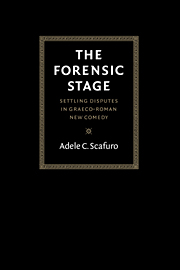Book contents
- Frontmatter
- Contents
- Preface
- Author's note on terminology, transliteration, translation, and texts
- List of abbreviations
- Introduction
- PART I PRE-TRIAL PLAYS
- PART II RECONCILIATION AND ITS RHETORIC
- PART III PLAYING ON THE BOUNDARIES OF THE LAW
- APPENDICES
- 1 Official arbitration in the Attic orators
- 2 Private arbitrations and reconciliations in Athens
- 3 Remedies for enslavement, kidnapping, and slave stealing in Athens and Rome
- 4 Controversial summonses in Rudens and Persa
- 5 Threats of lawsuits and self-help remedies in Graeco-Roman New Comedy
- 6 Ambiguous arbitri in Roman Comedy
- 7 Moikhos and moikheia
- Works cited
- General index
- Index locorum
1 - Official arbitration in the Attic orators
Published online by Cambridge University Press: 03 March 2010
- Frontmatter
- Contents
- Preface
- Author's note on terminology, transliteration, translation, and texts
- List of abbreviations
- Introduction
- PART I PRE-TRIAL PLAYS
- PART II RECONCILIATION AND ITS RHETORIC
- PART III PLAYING ON THE BOUNDARIES OF THE LAW
- APPENDICES
- 1 Official arbitration in the Attic orators
- 2 Private arbitrations and reconciliations in Athens
- 3 Remedies for enslavement, kidnapping, and slave stealing in Athens and Rome
- 4 Controversial summonses in Rudens and Persa
- 5 Threats of lawsuits and self-help remedies in Graeco-Roman New Comedy
- 6 Ambiguous arbitri in Roman Comedy
- 7 Moikhos and moikheia
- Works cited
- General index
- Index locorum
Summary
Official arbitrators received their cases from the Forty, and AP 53.1 reports that the Forty are the officials “from whom plaintiffs obtained a hearing in the other private suits.” It is now generally thought that “the other private suits” refer to a specific set of dikai under the jurisdiction of the Forty (and hence of the official arbitrators) distinct from the graphai and dikai heard by other magistrates. Jurisdiction over dikai underwent changes during the fourth century; certain dikai which are “confirmed” for official arbitration in the middle of that century appear as emmēnoi and under the jurisdiction of the eisagogeis in AP 52. 2 (thus dikai proikos and aikeias, and possibly aphormes and trapezetikai; see Rhodes 1981 ad loc). The date of the change of jurisdiction cannot be determined, but most scholars have accepted Gernet's (1939) arguments that dikai emmēnoi did not exist during the first half of the fourth century. Dikai emporikai (a subset of dikai emmēnoi) came into existence sometime between 355 and 342 (see MacDowell 1990 apud Dem. 21. 176); dates for other dikai emmēnoi cannot be specified beyond saying that they were introduced at some point between the early 340s and the composition of the AP (set E. Cohen 1973: 186–91; Harrison 2. 21).
While our limited sources attest to only nine or ten dikai (and the identification of some of these is disputable) under the jurisdiction of the Forty, modern authorities usually assume that they were responsible for most private suits (cf. Isokr. 15. 237).
- Type
- Chapter
- Information
- The Forensic StageSettling Disputes in Graeco-Roman New Comedy, pp. 383 - 392Publisher: Cambridge University PressPrint publication year: 1997



